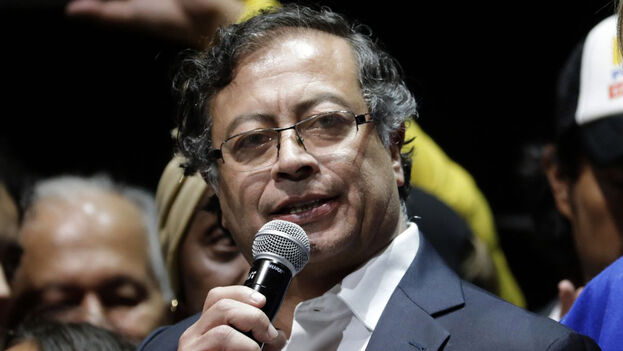
![]() EFE (via 14ymedio), Manuel Fuentes, Redacción América, 3 May 2023 — The leaders of the Latin American left in power are encountering serious difficulties in carrying out ambitious structural reforms of their governments. The weakness of the political support that allowed them to achieve power and the fragmentation of parliamentary representation are the main reasons, according to experts consulted by EFE.
EFE (via 14ymedio), Manuel Fuentes, Redacción América, 3 May 2023 — The leaders of the Latin American left in power are encountering serious difficulties in carrying out ambitious structural reforms of their governments. The weakness of the political support that allowed them to achieve power and the fragmentation of parliamentary representation are the main reasons, according to experts consulted by EFE.
In Chile, Gabriel Boric has not managed to get Congress to approve the tax reform and, what is more serious, the draft Constitution originating in the Convention that was going to replace the Constitution that came from the dictatorship of Augusto Pinochet.
The Colombian president, Gustavo Petro, also has problems promoting health, labor and pension reforms. The distrust of the parliamentary groups that supported him has forced him to make a profound restructuring of his cabinet, the second since he assumed the Presidency, just nine months ago.
And in Mexico, Andrés Manuel López Obrador has also failed to move forward with the militarization of the National Guard, the reform of the electoral body and the modification of the regulatory framework on energy matters that he proposed.
The reasons why the leaders of the Latin American left are having so many difficulties in implementing basic elements of their political programs are diverse.
But except in the case of the draft of the Chilean Constitution, mostly rejected by a citizenry dissatisfied with the text submitted to a plebiscite, the common denominator of these setbacks is the absence of political support from the legislative power, a phenomenon that the Argentine political scientist and jurist Daniel Zovatto calls “the overnight vote.”
“I loan you the vote during the night so that you win the election and then withdraw it in a timely manner,” describes the regional director of the International Institute for Democracy and Electoral Assistance (IDEA).
“The big issue is the governance of presidential systems in the contexts of political fragmentation,” he explains.
In Mexico, President Andrés Manuel López Obrador led what he called “the fourth transformation,” but the structural reforms of key sectors he proposed did not go ahead due to legislative and, in some cases, even judicial rejection.
Among the latter is the militarization of the National Guard, overthrown by the Supreme Court because it is a civil security organization that cannot be attached to the Ministry of Defense.
Likewise, the attempt to eliminate the institution in charge of organizing the voting processes, the National Electoral Institute (INE), generated rejection and criticism from the opposition and the Judiciary, which could affect the presidential elections of 2024.
The reform of the energy sector, which would have benefited the state companies Petróleos Mexicanos (Pemex), the Federal Electricity Commission (CFE) and the creation of the Institute of Health for Welfare suffered the same fate.
In Colombia, President Gustavo Petro has not had it easy in Congress either, since he doesn’t have the necessary majority to achieve the approval of his ambitious social reforms.
The coalition that he had managed to form for that purpose was declared broken by himself a week ago, after noting that his project to reform the health system aroused strong resistance in Parliament.
The Government’s machinery, which worked in the first six months of its mandate, has stumbled into the discussions on health reform, which have finally precipitated a cabinet crisis that has cost seven of the eighteen ministers their positions, including those for Finance, the Interior and Health.
With those changes, Petro seeks to rebuild his support base in Congress and will try to negotiate separately with each senator and representative to the House, but not with the entire bench, as before.
Except in Mexico and Venezuela, the presidential elections in Latin American countries provide for a second round if none of the candidates reaches a sufficient majority in the first round.
And although in the ballot, the candidate who manages to attract the vote of the electorate that supported the candidates who did not pass to the second round is usually imposed, the truth is that “the Congress was constituted in the first vote.”
This is the case for Gabriel Boric, Gustavo Petro and Lula da Silva, who prevailed “with the votes given to them by those who did not want their opponent to win, but who are not from their party,” explains Zovatto.
“They come to the presidency without their own majority in the Congress or with a coalition that is a kind of Noah’s ark, due to the high degree of heterogeneity of those who make it up.”
Post-election support “is not enough later to have its own majority in Congress, and if they manage to get it, it is very difficult for them to maintain it, because their proposals for structural reforms can break up the coalition,” says the regional director of IDEA.
“And since they can’t quickly fulfill their promises of change, they begin to wear out quickly,” concludes the Argentine political scientist.
Translated by Regina Anavy
____________
COLLABORATE WITH OUR WORK: The 14ymedio team is committed to practicing serious journalism that reflects Cuba’s reality in all its depth. Thank you for joining us on this long journey. We invite you to continue supporting us by becoming a member of 14ymedio now. Together we can continue transforming journalism in Cuba.
